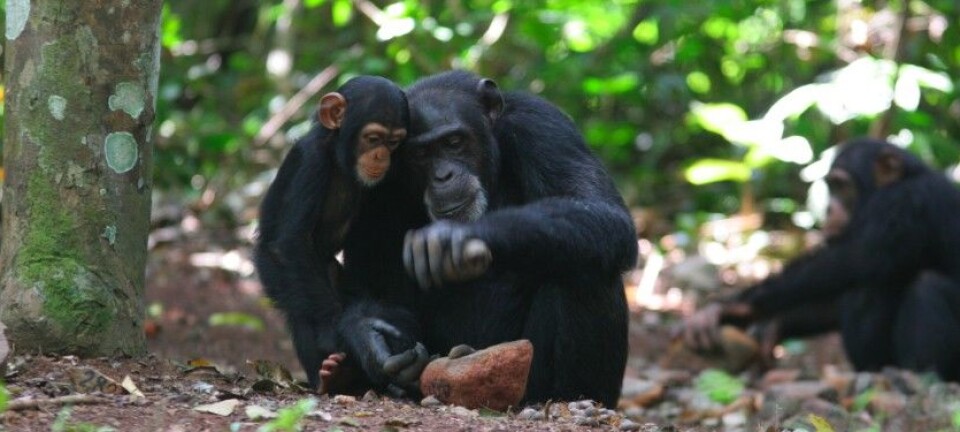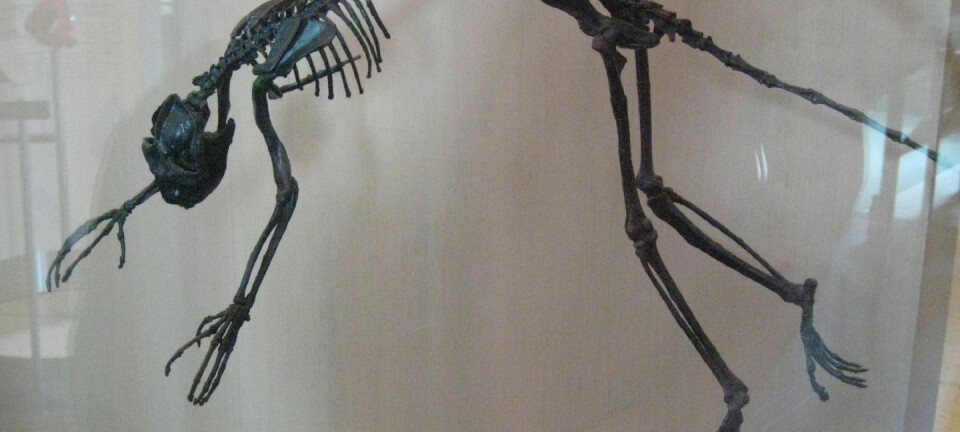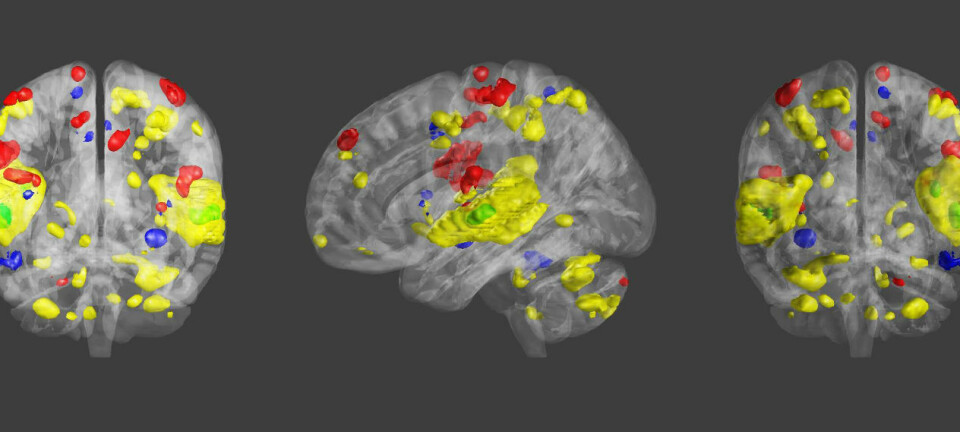An article from University of Tromsø – The Arctic University of Norway
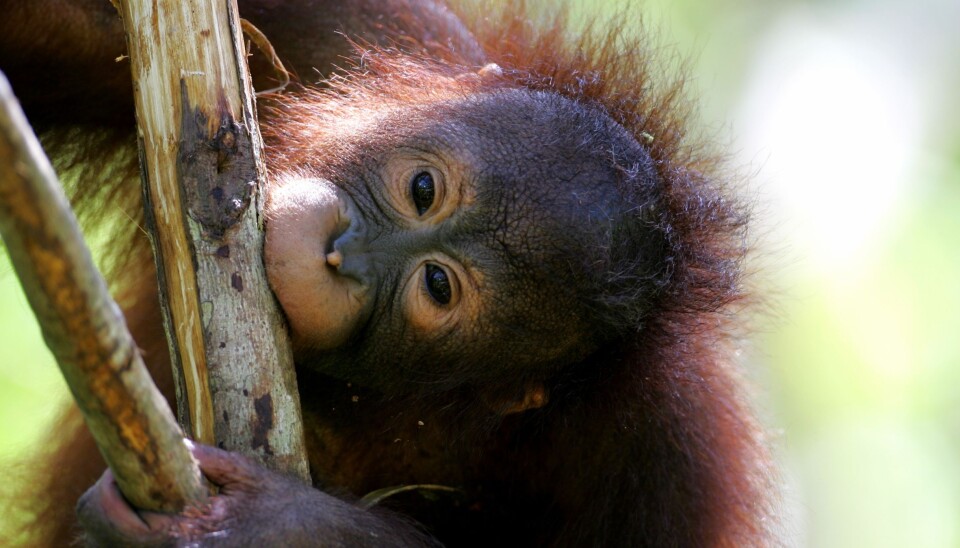
No fan of music and mathematics
You can hand a drumstick to an ape, but you can’t make it play a beat. This could be one of the reasons why apes have not developed an advanced language.
Denne artikkelen er over ti år gammel og kan inneholde utdatert informasjon.
There are many things which set us humans apart from other animals, but one of the distinct differences is our advanced language.
Other animals also use language, meaning that that communicate with each other, but there is no evidence that other species than humans have developed a language with abstract symbols and grammar.
The question remains: How did we develop this ability? Linguists across the globe are attempting to find the answer. Most believe the ability to use language has a clear biological origin:
“This is because all humans have this. Language is not conditional on culture. In comics and Hollywood movies we get the impression that cultures with primitive technology also have a primitive language, but this is not the case. Every single language is complex, in the sense that they have abstract words and grammar. Even in simple words such as “dog” the connection between the meaning and the symbol is abstract. There is no sound in the word “dog” which could indicate the meaning to someone who is unfamiliar with the language,” says Peter Svenonius.

He is a professor at the Center for Advanced Study in Theoretical Linguistics (CASTL) at the University of Tromsø (UiT).
Common traits with apes
Based on Darwin’s theory on the origin of species, all living creatures share a common ancestry. If we study our closest relatives in the animal kingdom, the apes, we still share a number of common traits. Much of our behaviour can be glimpsed in the behaviour of apes, and their DNA is not all that different from ours. But they appear to lack the linguistic ability of humans.
“However, apes can learn that the word “dog” means “dog”, but they do not cultivate such words themselves. Since we have this ability and they don’t, it could indicate that our linguistic ability developed fairly late and quickly. In evolutionary terms, it happened in a short period of time, only a few million years,” says Svenonius.
So how did it happen?
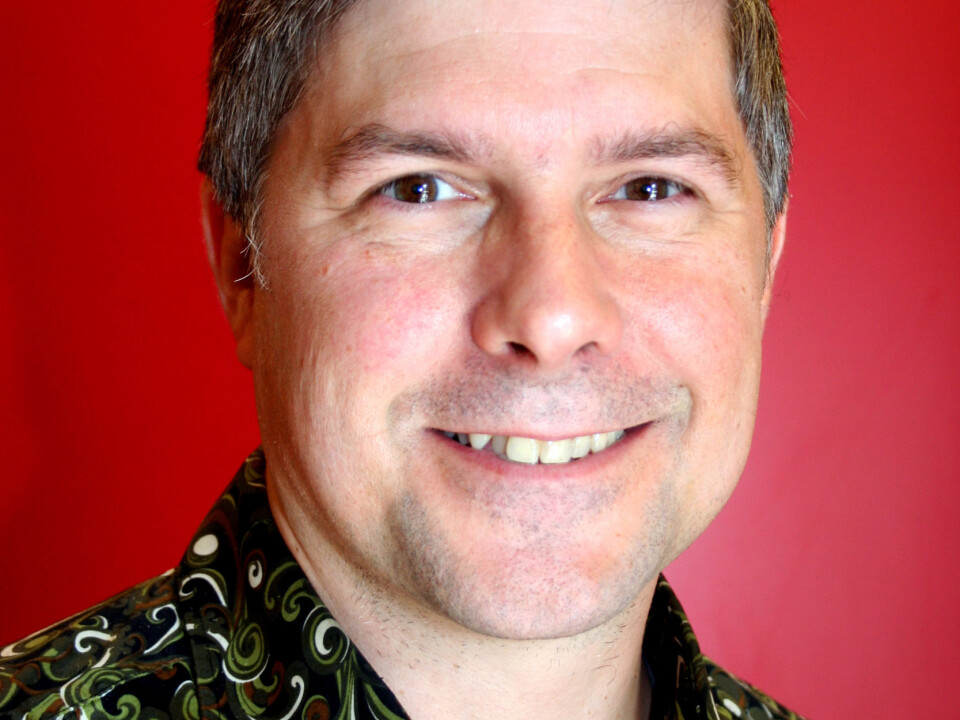
Humans have larger brains, but Svenonius thinks there is something more to it.
Lack music skills
There are two other abilities apes lack as well. Linguists across the world believe this can partially explain our language ability. One is music:
“Wherever you go in the world, people have developed music, whether it is traditional songs in indigenous cultures or drums. Apes, on the other hand, have no sense of rhythm and they can’t hold a beat. If you put a drum in front of an ape, it might very well start beating it, but it is unable to create a beat or rhythm," says Svenonius.
Apes do not like music either. Experiments show that if apes are given the choice between two rooms, and there is music - no matter what type - in one room, the apes will choose the room without music.
Language and music share common characteristics. Both combine sounds in a pattern in order to communicate something to the listener. In a 1998 study carried out by American researchers, eight musicians listened to a piece by Bach while reading the notes from the same piece. The written notes were read and interpreted by a specific area in the right half of the brain. The equivalent area located in the left half of the brain, reads letters and words. The findings suggest that the same type of brain function developed for both linguistic and musical information.
Can't use mathematics
The other ability apes lack, is the ability to use mathematics. Not all humans have the same ability to the same degree. In some cultures there is every little counting and no accounts are kept, but humans nonetheless have the ability to learn it.
Children are very good at counting starting around the age of two.
"An ape can also learn to count, but it takes a very long time. Human children are able to quickly understand that the number five follows four, but to an ape this is not as easy. It seems as if they do not understand the system behind it,” explains Svenonius.
The fact that apes lack the ability to make music and use mathematics has led linguists to believe that this could have something to do with our linguistic ability.
“This is a fairly new proposition. Ten years ago, this question wasn’t even raised,” says Svenonius.
An original language
Another issue which fascinates linguists is that the linguistic knowledge appears to be remarkably similar between humans. For instance, all the languages in the world contain verbs and nouns. How come?
It is assumed there are two main reasons for this. The first is that there is an original language, and that throughout the years, other languages developed from this original language. If the original language had verbs and nouns, the other languages “inherited” this. Svenonius does not think this is the best explanation:
“Languages change fairly rapidly. Just look at how different Norwegian is from Norse, although you only have to go back 1,000 years. 5,000–10,000 years ago, languages were even more different from the ones we know today. It seems rather strange that during all these thousands of years we haven’t found a better solution than verbs and nouns.”
Born with grammar
Svenonius leans more towards the other explanation.
We are forced to use verbs and nouns as this is what our brain prefers. We prefer to categorise the world, including things (nouns) and actions (verbs). When we then want to express ourselves, this categorisation appears in our language.
According to Svenonius the best argument for this is the language which spontaneously occurred between deaf persons. In many societies they did not understand how to communicate with the deaf. The deaf still developed a language between themselves.
"Studies of these languages show that even these contain verbs and nouns. As the deaf have not heard others talking, it gives a very good indication that this comes from the brain and not some original language. We are born
with some sort of universal grammar,” says Peter Svenonius.







